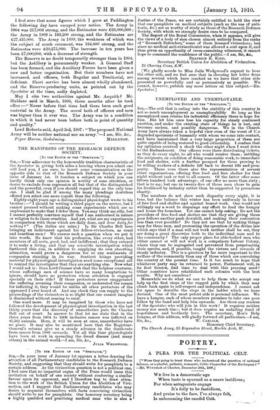THE MANIFESTO OF THE RESEARCH DEFENCE SOCIETY.
[To TBX Eamon or THE "Srscraroa."] SIR,—Your adherence to the honourable tradition characteristic of the Spectator in giving both sides a hearing where you admit one will lead you, I am sure, to insert some communication on the opposite side to that of the Research Defence Society in your issue of January 1st. It touches a subject on which you can hardly think only one opinion is worthy of sane attention, or desire to exclude from expression all but that of the distinguished and the powerful, even if you should regard this as the only true one. I shall be glad if among the many pleadings doubtless offered you select one more cogent than the following.
Eighty-eight years ago a distinguished physiologist wrote to his brother :—" I should be writing a third paper on the nerves, but I cannot proceed without making some experiments which are so unpleasant to make that I defer them. You may think me silly, but I cannot perfectly convince myself that I am authorised, in nature or religion to do these cruelties. And yet, what are my experiments in comparison with those which are daily done, and done daily for nothing ?" (The italics are mine.) Is Sir Charles Bell here bringing an indictment against his fellow-vivisectors, as cruel and heartless men ? We answer such a question when we put it into words. He knew that his profession, like every other, had members of all sorts, good, bad, and indifferent; that they entered it to make a living, and that any scientific investigation which furthered this aim, in addition to supplying its own absorbing attraction, would prove a dangerous foe to any sentiments of compassion standing in its way. Sentient beings providing material for physiological investigation need some exceptional aid to remind the investigator that they are anything else. Now what I would ask is : Does Lord Cromer wish that the helpless creatures. whose sufferings men of science have so many temptations to ignore, should have no protectors whose attention is engaged specially on their side? If those protectors never exaggerated the suffering arousing their compassion, or underrated the reason for inflicting it, they would be unlike all other protectors of the oppressed I ever heard of. And any check they can supply to the proceedings of the vivisectors is so slight that one cannot imagine it diminished without ceasing to exist.
One word more. It may be imagined by those who have not followed the development of physiological investigation in the last thirty years that the discovery of anaesthetics puts Sir Charles Bell out of court. In answer to that let me state that in the three years from 1904 to 1906 inclusive cancer was inflicted on 41,561 animals. Here, it will be seen at once, anaesthetics have no place. It may also be mentioned here that the Registrar- General's returns give us a steady advance in the death-rate from cancer from 1886 onwards. Yet all this time physiologists have been at work in spreading the dread disease (and many others) in the animal world.—I am, Sir, &c.,
JULIA WEDGWOOD.






































 Previous page
Previous page